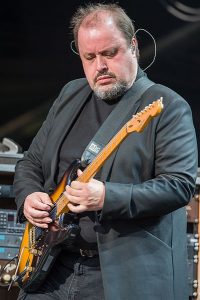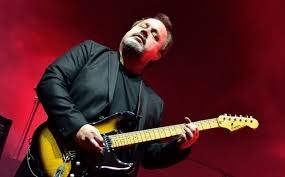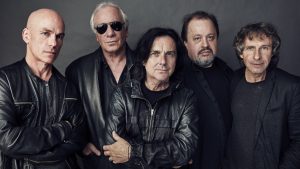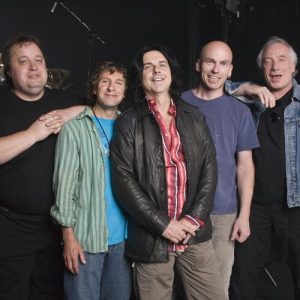HIT CHANNEL INTERVIEW: February 2022. We had the great honour to talk with a legendary musician: Steve Rothery. He is best known as a founding member and guitarist of Marillion, one of the greatest progressive rock bands in the last 40 years. Marillion are releasing their new studio album, “An Hour Before It’s Dark” (earMUSIC) on 4 March. Read below the very interesting things he told us:
 How much did the coronavirus affect the making of “An Hour Before It’s Dark” album?
How much did the coronavirus affect the making of “An Hour Before It’s Dark” album?
Well, it affected it in a lot of different ways. First of all, there was a period of time when obviously we couldn’t work together, because of the lockdown in the UK. There was a period of time when I didn’t feel comfortable go and work with everyone because it was before the vaccines come out; because I have type 2 diabetes and also because of my weight I had to be very careful. So, there was a couple of months in the early stage when we had done some jamming and we got some ideas and then when the virus hit whenever it was -March, April ‘20- that was when it stopped. So, we started working all together again a couple of months later and then, there was a situation where there was a complete lockdown, so we all had to go home and then we all got together again and carried on working. So, it probably took six months longer than it would have done without the pandemic thing.
Do you consider “An Hour Before It’s Dark” a concept album?
I don’t think it’s so much a concept album, it’s an album that is linked by common threads. Steve (ed: Hogarth -vocals) didn’t want to write about the pandemic, he said that very early on as we were living through it. I think it can’t help but come out in your work when you are an artist, especially when you are a lyricist. Yes, the pandemic, climate change, various things just come to the front when you are faced with the situation. So, tracks like “Murder Machines” and especially the end of “Care” wouldn’t have existed without the pandemic.
Could you please tell us everything we should know about the amazing “The Crow and the Nightingale” song, particularly the solo?
Oh well, thank you! That’s actually my favourite track of the record. I think it’s one of the best Marillion tracks we have ever done. It was a curious track because it was a little of a slow-burner to start off with. I always loved the lyric but some people in the band weren’t kind of convinced that it went anywhere, but as we developed it and then we added the different elements -the string quartet and a harp and then of course the choir in the end section- it just came to life. Yeah, I think it’s one of the finest moments we have ever achieved. I recorded the solo, at my studio, at home, in my garage. I have a Pro-Tools studio set up with lots of guitars that I am using, pedals, as you can imagine, a lot of stuff… So, I recorded that and some of the other guitars, actually: I did the solo on “Care” as well, it was one of the two solos that I recorded in my garage, as well. So, I would record several takes and make a composite of the best moments and then send it via WeTransfer to Michael Hunter, the producer, who would drop it into a session. So, it’s only really when you mix the album, that you hear all these different elements all put together. It was the first time I heard the choirs when we were mixing the record. It’s amazing to hear something that we transformed. The guitar solo was already a great moment but then you hear it in the context of the voices as well and it just takes you somewhere else. I am pretty proud of it.
 Obviously “Care” is a very ambitious composition. What is the song about?
Obviously “Care” is a very ambitious composition. What is the song about?
The first part of the song is about a friend of Steve’s who was basically having treatment for cancer and he wasn’t looking very good for a long time. You know, he used a lot of drugs, but thankfully he recovered. At the time, we were halfway through with the pandemic situation and the sacrifices that the medical and care staff have made around the world. Sometimes, at the cost of their own lives, to do their job and to try and save people’s lives and you just see the amazing bravery and dedication of these people. So, the end section of “Care” (ed: “Angels On Earth”) is almost like a tribute to them, really. I mean, lyrically it is incredibly powerful and moving and again the choirs just takes it to a different level.
Why did you decide to record again at the Real World Studios?
Real World is an amazing place. Just everything about it: The location, the acoustics, the amount of incredible outboard equipment they have for recording; Αll Neve microphone preamps. So, it is always good to go there to get a different sound, especially with the drums. It’s a very inspiring place. The thing is about our own studio: It’s great because it’s our own studio, that means that it doesn’t really cost us that much money to run, but it’s local, it’s like a 20-minute drive from me and maybe 30 minutes from some people in the band. But because of that you can work there part-time, so your head isn’t always in that place. When you go to the Real World, you live there and everyone is just living the music for 12 hours a day and it brings a different kind of energy because of that. Also, it was a great place to film a documentary. There is a brilliant documentary on this special edition that goes with the album, that is filmed there and it just looks incredible as a place. You are there with this big control room, with these big glass windows, with a lake outside, with a swan swimming past the window. It’s crazy. Really incredible.
How important was Michael Hunter’s (producer) contribution to “An Hour Before It’s Dark” album?
Very-very important. First of all, Mike’s role is to record everything we do. We write a lot by jamming, so he records those ideas, catalogues them and uploads them to a Soundcloud account. We all listen to them and make comments and choose our favourites which we then take them to the next stage of arranging. Mike’s job is to try and make sense of that and put sections together and get us to develop sections and just have a picture in his head about how these tracks might work. We are very different people, the five of us. We have different taste in music and different personalities, so sometimes the job of the producer is almost like a referee: To stop the band falling out and splitting up. Sometimes it’s a crazy job. We have said it’s like hunting cats. It’s like trying to get those five people to do anything. Sometimes, you could pull your hair out in frustration, but really he kept it together. Yeah, a lot of the credit for how special the album sounds has to go to Mike.
How challenging was it for you to write the successor to an excellent album like “Fear” (2016)?
Yeah, we decided because we are all getting old -we are all in our 60s now, some people are in their mid 60s- that we are not going to make that many records, so it’s really important that everyone we make to be as good as possible. When you are coming back of an album that ‘s been as critically acclaimed and as beloved by the fanbase as “Fear”, then our criteria was that we had to make an album that we felt was as good as “Fear” and each of the songs wouldn’t have sounded out of place on the previous album, really. So, that was our target. Yeah, because it depends on how you count this. Some people count this as this is our 20th album, I have counted it as our 18th original studio album. My ambition with the band has always been to make at least 20 albums before we retire. In my head, we got two more to go.
 Are you looking forward to doing the Cruise to the Edge and the Marillion Weekends in the following months?
Are you looking forward to doing the Cruise to the Edge and the Marillion Weekends in the following months?
The Marillion Weekends are always amazing. Some of our most dedicated fans are flying from all four corners of the world and it’s just an incredible experience. The Cruise to the Edge is a different kind of experience: It’s slightly surreal. There is an American television series called “The Twilight Zone” and it’s a little bit like that, really. Because you are on this boat with these so many thousands progressive rock die-heart fans and it’s like it’s still the ‘70s or something. It’s just really-really weird (laughs).
How much has you playing style changed over the years?
That’s very hard for me to judge. I think it’s more down to my approach to sound as maybe evolved over the years. I got it, I was happy with the sound by the time we made the “Fugazi” album in 1984, in which my solo sounded with a clean, chorus echo sound. I used it all the way up until the “Anoraknophobia” (2001) album. Then, I started use more valve amplification and different kinds of tones and effects. With this album I tried to find things that are interesting; some sounds you don’t overuse. Sometimes it’s nice to use something just for a little short section like the laser type of sound I used in couple of places. I used tremolo quite a lot, but in a subtle way in some tracks. Different things as an old pedal called the Mojo Vibe. I used this pedal called Electro-Harmonix Pitch Fork octave box (ed: pitch shifter) that gives like almost all the mike sound on a couple of things and Roger Linn Adrenalinn pedal which is an amazing MIDI-synced filter modulation. I ‘ve always tried to find interesting things. You get neo-classic sounds that you have to use probably on ¾ of the songs and then you find things that maybe sound a little bit different. There is quite a lot ambient-type guitar. You probably wouldn’t even know it was guitar because the reverb pedals I use, it’s going like a shimmering reverb. So, the way I swell notes with this particular sound makes it almost sound like a synth. There are a few places where you hear this, even if you don’t know what it is.
Why weren’t you satisfied with your guitar sound on the first two Marillion albums?
It was really the first album (ed: “Script for a Jester’s Tear” -1983). I didn’t have the experience, I didn’t know the sound I wanted, so I was using maybe my old Yamaha SG-2000. I think I had an Orange amp in the early days. I can’t remember when I switched to Marshalls. Anyway, it wasn’t a sound that I was in love with. We went to do our first American tour after the first album, that’s when I started using the Roland JC-120 (ed: amp), which I fell in love with. I brought it back to England. That was the amp I started using on “Fugazi”. The thing about the sound of “Fugazi” is because at the time it was recorded there was a fashion to make everything very clean and bright sounding. So, for me some of the guitars on “Fugazi” are too bright, there is not enough warmth in the sound. By the time we did “Misplaced Childhood” (1985) in Berlin with Chris Kimsey who obviously worked with the Rolling Stones, I think I had the best of both worlds: I had that full, chiming sound but recorded in such a way that it wasn’t brittle sounding like some of the sounds in “Fugazi”.
 What’s your reaction when people call you an “underrated guitarist”?
What’s your reaction when people call you an “underrated guitarist”?
(Laughs) It depends who you talked to. Because of the style I play, because of the style of music that Marillion play, I am never gonna be acclaimed as another Satriani or I don’t know who else. It’s a very distinctive and unique the way that I play and approach guitar based on what things excite me. For me, the guitar is not about playing fast, it’s about conveying emotions and touching people. The way bending notes and a vibrato can reach inside and touch one’s soul with a few notes, in a way that playing fast and shredding will never do. That’s like an Olympic sport. If that is the sort of thing that you wanna do, that’s fine, but music is a sort of communication, really and you wouldn’t try and communicate by going “brl-brl” (ed: He plays fast with his lips) stupidly fast and music is the same: Every note should have a meaning and should be there for a reason.
In your opinion, what did Steve Hogarth (vocals) bring in the band when he joined?
Steve is also an excellent keyboard player. He brought and added musical input, he’s a great songwriter and lyricist. Just a more reasonable personality, we should say, than what we have been used to. So, it was a rebirth for the band. It’s only when you look back, you realise how lucky we were to find someone we could have such a long and fruitful chemistry with, over all these years.
You are the pioneers of crowdfunding. Had you realised then (in the late ‘90s) that you were ahead of your time?
Not really. Now, it just seems the obvious thing to do. The Internet was just starting to take off and it seemed like a great way to keep in touch with your families, which is proved to be with the Marillion fanbase and community around the world, is like one global family. It’s quite incredible, really.
Do you feel lucky that you have a very loyal fanbase?
Oh, totally. Yeah. That’s the only reason we can do the crowdfunding. I mean, all the way back to when we did the “Anoraknophobia”. Because people understand what the band represents and they trust that we can still come up with music that they can enjoy and find exciting. So, yeah, it’s an incredibly loyal fanbase.
Did you expect the commercial success of the “Kayleigh” single in 1985?
Not, at all. That was a complete shock. Yes, it’s just very strange when that happens. It felt for us it was just a part of “Misplaced Childhood”. Yes, it had a nice hook in, but no, there was no expectation for it to be a hit, at all.
 Do you have memories of your tour with Queen in 1986?
Do you have memories of your tour with Queen in 1986?
Yes, some great memories. I spoke to Brian May (guitar) and Roger Taylor (drums) quite a lot. I remember going up in a helicopter when we were playing a gig with them in Germany, a big festival. I think it’s the biggest audience we have ever played to. It was like 150.000 people and we went up in a helicopter over the crowd and it was just like a sea of people as far as you could see. It was quite incredible and Brian came on stage and played “Market Square Heroes” with us that day, which was a lot of fun. His guitar sound was the loudest thing I have ever heard. It was like a Jumbo jet taking off behind you. It was incredible.
Were you a bit terrified when Brian May joined you on stage for “Let’s Twist Again” in Cologne, Germany in 1986?
No, not really. It’s a different thing. I think Queen were such an incredible band and they had very much their own approach to their own sound, but it was fun to get to know them a little bit.
How much impact did (Pink Floyd’s) “Shine On You Crazy Diamond” (1975) have on you as a young listener?
Listening to that when it came out, was the “eureka” moment for me. I thought: “How good is this!” and “What a way to spend your life!” and nothing else seemed important, really, after that. It’s just like: “That’s what I want to do” and I’m incredibly lucky that I have managed to do it and it’s the 43rd year I’ve been in Marillion. So, that’s a pretty good record.
How emotional was it for you to play “Market Square Heroes” (1982 single) with Fish at the Market Square in Aylesbury in August 2007?
It was fun. It was the anniversary of “Market Square Heroes”. Fish was playing there, he had just split up with his fiancée and we thought it would be quite a nice gesture. We didn’t really expect to create the hysteria that it did in terms of the media, and if we had known that, maybe we wouldn’t have done it, but it was a fun thing to do.
 Any update regarding your upcoming space-themed “Revontulet” solo album?
Any update regarding your upcoming space-themed “Revontulet” solo album?
Ah, that’s a very good question. The thing is most of my energy has been taken up by working on the Marillion album. I mean, there are lots of guitars on this new record (ed: “An Hour Before It’s Dark), but I do still work on my album, as well. I’ve got three tracks completely finished, two or three tracks half-finished. It’s a case of finding the time, really. You only have so much energy to spend, but I will definitely finish it this year. I’d like to come and finish it, so it comes out in September, but I honestly don’t know. At the moment, I am playing with the German band Tangerine Dream in a week and half’s time. So, my current job in between working with Marillion and rehearsing for the Marillion Weekends, is try and work out what I am gonna play in a couple of their songs. I’ve been sketching that out, which once I put together, I’ll have to learn how to play. So yeah, I’m pretty busy.
Are you optimistic about the future of progressive music?
I think it will always be progressive music, it will always be fans of progressive music and it will always be bands that want to play progressive music. The problem is it’s never gonna be mainstream enough for most of those bands to make a career out of music, so it’s something that you do for the love. I mean, with Marillion we are incredibly lucky: We are one of the very few bands that can hope to do that. That’s because we have been around for so long, this is our 18th album, but for most young bands, you don’t sell physical product anymore. Nobody under 30 wants a CD, everybody wants to stream content as they want it. Streaming doesn’t generate enough income to support four or five musicians, so it becomes a different thing. There will always be people playing this music, because it’s challenging, it’s inspiring and it does something that no other style of music does, because of the freedom it gives you to play different styles and genres, but I can’t imagine that many young bands can be able to go professional playing progressive rock music.
Will there ever be a Marillion concert in Greece?
I would love to do a Marillion concert in Greece. I did a guitar thing in Kavala 12 years ago. I ‘d love to. I think we haven’t been approached by a promoter with a deal that makes sense because obviously you have to fly in with equipment and also Marillion as an entity, there are quite a lot of people that we employ; we have a lot of gear and a lot of crew. Sometimes, it’s difficult enough just to tour countries like Italy. So, to go as far as Greece… I personally would love to. I would love to go there with my solo band. We travel a lot lighter (laughs). We ‘ve got three shows in Europe in seven weeks’ time. So, if you know any good Greek promoters, put them in touch.
In 2016 you published your photo book “Postcards from the Road”. How did you come up with this idea?
I’ve always taken photographs, all the way through the history of the band and I just thought it would be cool to share them because it illustrates history in a way words can’t do, really. To capture these moments I think it’s very-very special and I’ve got so many photos. It’s probably at least 3, maybe 4 volumes worth, but I must start doing the second volume at some point. Again, I give myself so many jobs to do, but sometimes it’s hard to get round to it. The next volume will start probably just before the recording of the “Brave” (1994) album with all my photos from the chateau and the recording of “Afraid of Sunlight” (1995) probably, as well.
Did you have a good time at a Wembley Arena Marillion concert in 1987 when Bruce Dickinson, Janick Gers and Jimmy Bain (Dio) joined you on “With a Little Help from My Friends” (The Beatles)?
Yes, that was a lot of fun. They are a great band, Iron Maiden, so it was fun to do that. We did a charity gig at Hammersmith (ed: in 1986) with various people: Mike Oldfield, Roger Chapman (ed: Family -vocals). So, yeah, it was always fun to do that sort of gigs.
 You grew up listening to Genesis and now you are friends with Steve Hackett (Genesis guitarist). Is it a bit surreal?
You grew up listening to Genesis and now you are friends with Steve Hackett (Genesis guitarist). Is it a bit surreal?
It’s incredibly surreal. It seems more surreal because Steve and I paid a visit to Whitby, in North Yorkshire where I grew up, because his wife, Jo, and my wife, Jo, we are all good friends, we go out for dinner quite regularly and chat. We ‘ve been working on some ideas on and off for about the last five-six years. Anyway, we had a couple of days up in Whitby, I was showing him around the streets and this is a place where as a 15-year old music fan discovering Genesis and discovering the guitar. You know, Steve is one of my three heroes. So, for me going back there 45 years later it was pretty incredible. That’s another thing that I am doing amongst all my other projects. We will do a record together at some point.
What is like to be a rock star in Chile?
(Laughs) It’s very surreal, actually. Again, “The Twilight Zone” because Chile is the country, maybe with the exception of Mexico, where rock music is played all the time on the radio and that’s what they love. They are so immersed in the culture of rock music, so, it’s the only place where I just walk down the street and people who sit outside of the bar be going: “Hey, Steve!” I was in an airport in the north of the country when I was doing these gigs at the observatories in the Atacama desert and there was a woman who was an archeologist, who was a huge fan, like a female Indiana Jones. So, it’s very surreal to go to a country so far away where you are so acclaimed. That was quite fun. I’ve got too many good friends there and I always have an amazing time.
A huge “THANK YOU” to Mr. Steve Rothery for his time. I should also thank Leonhard Janssen for his valuable help.
Official Marillion website: https://www.marillion.com
Official Marillion Facebook page: https://www.facebook.com/MarillionOfficial

